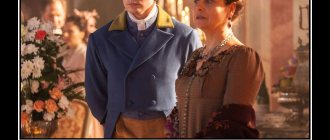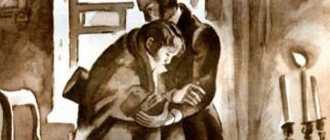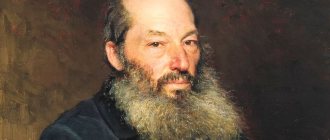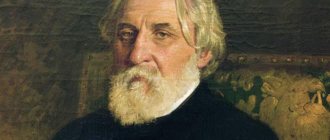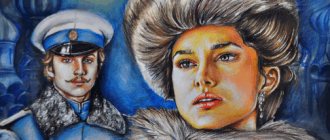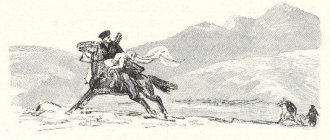Article menu:
- Family of Andrei Bolkonsky
- Appearance of Prince Andrei
- Personality characteristics
- Relationship with Lisa Meinen
- Engagement with Natasha Rostova
- Bolkonsky's military service
Roman L.N. Tolstoy's War and Peace is full of unusual characters. Some of them evoke delight and admiration, while others, on the contrary, act repulsively. The image of Andrei Bolkonsky in the novel is one of the most attractive, but at the same time tragic. His life path is not distinguished by happy moments, although, of course, they were present in the life of Andrei Bolkonsky.
Family of Andrei Bolkonsky
It is correct to say that difficulties in the life of Andrei Bolkonsky began with his very birth. They were not related to his origin and status in society; on the contrary, on this side Andrei Bolkonsky had certain privileges. He was lucky enough to be born into the family of a wealthy aristocrat, belonging to a noble and ancient family.
The difficulties in the life of Andrei Bolkonsky were associated with the character of his father - stubborn and tough. When Andrei was little, this, apparently, did not bother him much, but as he grew older, the situation began to change dramatically. As a result, their relationship with their father became very tense, and attempts to communicate ended in scandal.
Tolstoy does not mention Bolkonsky's mother. She is no longer alive, but the reader does not know how long and what influence this woman had on her son Andrei and, in particular, her husband.
Andrei was not the only child in the Bolkonsky family - he also had a sister, Marya. The girl was not distinguished by beauty, but she had a pure soul and a kind heart. Friendly, trusting relationships developed between brother and sister and remained so until the death of Prince Andrei.
Appearance of Prince Andrei
While nature ironically joked with the appearance of sister Marie, depriving her of beauty and attractiveness, the appearance of Prince Andrei was the complete opposite - he was distinguished by unprecedented beauty and attracted people with his appearance.
The details of his appearance are little known: “Prince Bolkonsky was small in stature, a very handsome young man with definite and dry features.” There are many episodes in the novel when either the author himself or other characters in the novel pay attention to the beauty and grace of Prince Andrei, but there is no detailed description here; such an impression is created using the epithet “beautiful,” allowing readers to create the appearance of this character themselves.
Personality characteristics
Looking at the living conditions and character of his father, it is worth assuming that the image of Prince Andrei Bolkonsky is also not devoid of complex characteristics and character traits.
Since the Bolkonskys were a significant noble family in many generations, this brought a significant imprint on Andrei’s life and upbringing. He was always in high society, so all the nuances and rules of etiquette among aristocrats were perfected to the point of automatism. However, it cannot be said that Bolkonsky was delighted with such a pastime - rather, on the contrary, the traditionality and predictability of meetings in aristocratic circles tired him out and irritated Bolkonsky: “Drawing rooms, gossip, balls, vanity, insignificance - this is the vicious circle from which I I can’t go out.”
In general, the image of Andrei Bolkonsky is endowed with positive qualities - he is a purposeful and noble person. His personality evokes admiration even among those people who dislike him - he knows how to earn authority in any society: be it secular society or army comrades.
However, many characters also note his negative qualities; mainly in such cases, the heroes compare him with his father, recognizing the obvious similarity of some qualities of the old Count Bolkonsky and his son.
For example, Andrei is a rather arrogant and rude person. From time to time he neglects the rules of behavior in secular society. This attitude can apply to a person of any gender and status. So, for example, at the ball, Prince Andrei ignores some of the characters in the most ill-mannered way: “Look how he treats the ladies! She talks to him, but he turns away.”
A contemptuous attitude towards others is in most cases expressed through non-verbal means - a contemptuous smile, a bored look. Although, if necessary, verbal communication is also used for the same purpose, such as, for example, “the unpleasant, mocking tone of Prince Andrei.”
Prince Andrei cannot be called a cheerful person. In most cases, he behaves with restraint, his face is impartial and does not express any emotions. “He rarely laughed, but when he laughed, he gave himself entirely to his laughter.”
We invite you to familiarize yourself with the image of Boris Drubetsky” in Leo Tolstoy’s novel “War and Peace”.
Despite such a set of qualities that clearly did not work in Andrei’s favor, he was a kind person who was capable of generous deeds: “It is impossible to count the good that he did here to everyone, from his men to the nobles.”
The beginning of the way. Selfishness and the desire for fame
In the first chapters of the novel, Prince Andrei with every fiber of his soul longs for personal glory in the military field. For the sake of this deeply selfish aspiration, he is ready to sacrifice everything: “I love nothing but glory, human love. Death, wounds, loss of family, nothing scares me.” The young man’s idol is Napoleon.
It is these aspirations and hopes that push Andrei to enroll in military service. He becomes Kutuzov's adjutant. At the decisive moment, the young man rushes into the thick of the Battle of Austerlitz, waving a banner raised from the ground - and practically calms the panic in the ranks of the Russian army, dragging an entire battalion into the attack. At this moment, we see Andrei in the present, without the patina of disappointment and rejection of the surrounding reality, which he was covered with at home from head to toe. This is a true patriot of his Motherland, a true nobleman and a man of honor. He knows no fear or doubt when it comes to protecting the interests of the state. He wants to serve the Fatherland with every cell of his body. And this egoist also craves national love and recognition, wants to become a hero - but this is for himself personally.
Andrei receives a serious wound - and all his ambitious aspirations go to hell. Bleeding on the battlefield, he looks into the heavens - and understands the value of life: “How come I haven’t seen this high sky before? And how happy I am that I finally recognized him. Yes! It’s all empty, it’s all deception, except this endless sky.” And after some time, the image of his hero is thrown into dust: the man sees Napoleon, grinning maliciously, looking at the battlefield, from where the groans of the wounded and dying can be heard.
Relationship with Lisa Meinen
In the novel, we meet the already adult Andrei Bolkonsky - at the beginning of the story he is 27 years old. Prince Andrei at this time was a married man and was expecting the birth of his first child.
Kutuzov’s niece, Lisa Meinen, became the wife of Prince Andrei. Despite the fact that such a relationship had every chance of becoming a successful catalyst in his military career, the relationship between the spouses was built not on self-interest or calculation, but on romantic relationships and love. Unfortunately, Prince Andrei did not succeed in becoming a happy father and husband - Lisa dies during childbirth. Andrei was in confusion - he had just returned home and found the last hours of his beloved wife’s life: “He entered his wife’s room. She lay dead in the same position in which he saw her five minutes ago.”
We recommend that you read the description of part 3 of the first volume of the novel “War and Peace” by Leo Tolstoy, chapter by chapter.
The child managed to survive, he was named Nikolenka - later Princess Marie, Nikolenka’s aunt, took care of his upbringing.
Engagement with Natasha Rostova
After some time, Prince Andrei still did not think about remarrying. An incident made him think about marriage. Prince Andrei, despite his controversial temperament, was always popular with women, and his father’s fortune made Bolkonsky a desirable son-in-law in virtually any family. Soon a candidate was found suitable for the role of Andrei Bolkonsky’s wife - she was to be Natalya Rostova, the youngest daughter of the Rostov counts, a revered family in aristocratic circles. Prince Andrei met Rostova at a ball and fell in love with her. Bolkonsky also became the cause of romantic excitement on Natalia’s part - the girl was captivated by a handsome and gallant young man.
Andrey did not delay the matchmaking - the Rostovs were delighted with this proposal and agreed to the marriage. The only person who was not satisfied with the future marriage of Prince Andrei was his father; he persuaded his son to postpone the wedding and postpone it for a year. Under pressure, Andrei agrees and goes abroad for treatment - this event became tragic in their relationship with Natalya - the girl falls in love with Anatoly Kuragin and plans to escape with him. Naturally, this state of affairs could not please the principled Andrei Bolkonsky - he was never able to forgive such injustice towards himself and then all the time sought a meeting with Kuragin in order to take revenge for such a dishonorable act.
Service. Participation in wars
Unable to lead an empty social life any longer, Prince Andrei goes to war to serve as an adjutant to Kutuzov. Another reason for this is dreams of fame.
His sense of self-worth was shown in his clashes with staff officers who were indifferent to the fact that the French had defeated the allied Austrian army. He says that if staff officers do not care about common success or common failure, then they are not officers, but “lackeys who do not care about the master’s business” (Volume 1, Part 2, Chapter 3).
Bolkonsky took part in the Battle of Shengraben. At the Battle of Austerlitz, he accomplished a feat: rushing forward with a banner, he raised the entire battalion to attack and was wounded in the head.
During the Patriotic War of 1812, Prince Andrei refused staff work in order to command a regiment. He became close to the soldiers and cared about their welfare. On the eve of the Battle of Borodino, the prince tells Pierre about the decisive role of the “spirit of the army”: “The battle is won by the one who firmly decided to win it” (volume 3, part 2, chapter 25).
During the Battle of Borodino, Bolkonsky received a shrapnel wound in the stomach from an exploding grenade.
Napoleon before the Battle of Austerlitz and Borodino
At the beginning of hostilities, Tolstoy shows the French emperor endowed with human traits. His face is filled with self-confidence and self-satisfaction. Napoleon is happy and looks like a "loving and successful boy." His portrait radiated “thoughtful tenderness.”
With age, his face becomes colder, but still expresses well-deserved happiness. How do readers see him after the invasion of Russia? Before the Battle of Borodino he changed a lot. The appearance of the emperor was impossible to recognize: his face was yellow, swollen, his eyes were cloudy, his nose was red.
Description of the emperor's appearance
Lev Nikolaevich, drawing the image of Napoleon in the novel “War and Peace,” very often resorts to his description. First he shows him among the marshals on a gray mare and in a gray overcoat. At that time, not a single muscle moved on his face, nothing betrayed his nervousness and worries. At first Bonaparte was thin, but by 1812 he had gained a lot of weight. Tolstoy describes his round big belly, white leggings on fat short thighs, high boots. He is a pompous man with a white, plump neck who smells of cologne. Readers later see Napoleon as fat, small, broad-shouldered, and clumsy. Several times Tolstoy focuses on the short stature of the emperor. He also describes the ruler's small, plump hands. Napoleon's voice was sharp and clear. He pronounced every letter. The emperor walked decisively and firmly, taking quick steps.
Other traits of Napoleon
The French Emperor considers war his profession. He loves to fight. His attitude towards the soldiers is feigned and pompous. Tolstoy shows how important luxury is to this person. Bonaparte's magnificent palace was simply amazing. The writer portrays him as a pampered and spoiled ghoul. He loves to be admired.
The real appearance of Bonaparte becomes obvious after comparing him with Kutuzov. Both of them are exponents of the historical trends of the time. The wise Kutuzov was able to lead the people's liberation movement. Napoleon stood at the head of the war of conquest. Napoleonic army died. He himself became a nonentity in the eyes of many, losing the respect of even those who once admired him.
Those who achieve the ideal are taken away by God...
Andrei is mortally wounded. Almost until his last breath, this courageous man clings to life: “I can’t, I don’t want to die, I love life, I love this grass, earth, air.” However, hearing the heavy steps of an old woman with a scythe, he submits to fate: he stops fighting, does not want to see anyone, and loses all hope.
No matter how bitter it is, the death of the hero occupies an important place in the characterization of Andrei Bolkonsky. Because this deeply gifted and highly moral person, tirelessly searching for his place in life, by the end of his life became practically a saint: he loved everyone, forgave everyone. Having reached such spiritual heights, he simply could not continue to endure the cruel disappointments that the thoroughly rotten and therefore even unreal high society was tirelessly preparing for him.
Previous
EssaysThe image of St. Petersburg in the novel “Crime and Punishment” by Dostoevsky - a description for an essay on the topic
Next
Essays “The Master and Margarita” analysis of Bulgakov’s work - the meaning of the novel, its genre and features
